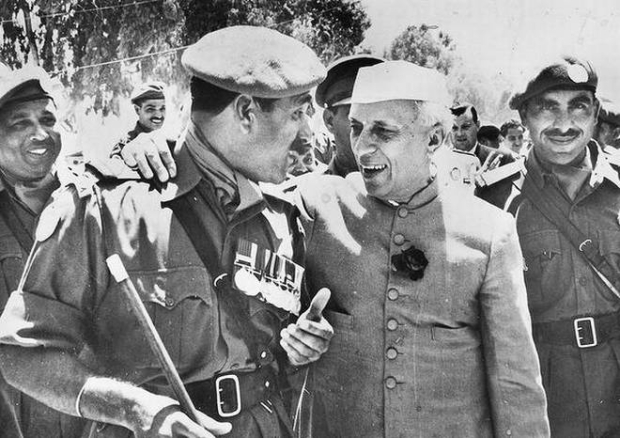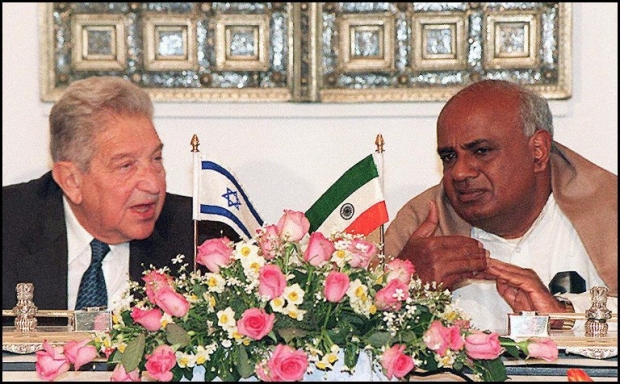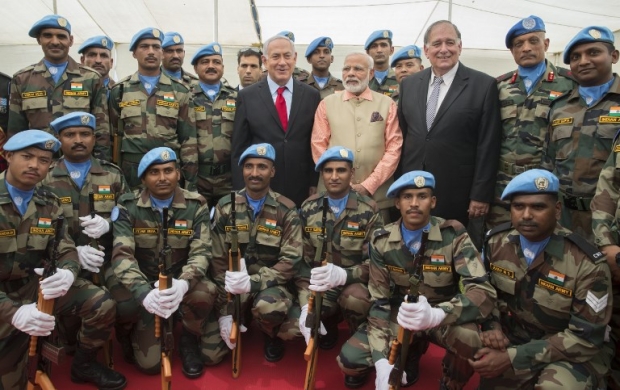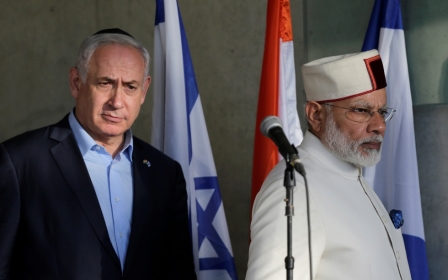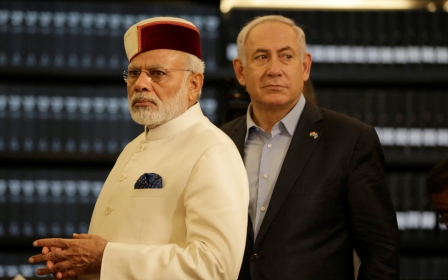'Economics not politics': How India built its relations with Israel
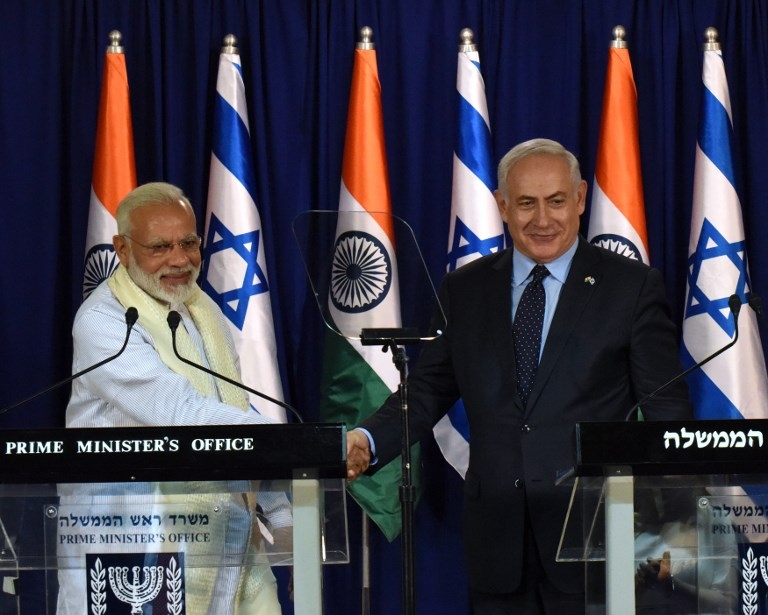
In 1960, Indian Prime Minister Jawaharlal Nehru had just flown into Gaza to meet Indian troops, stationed there with the UN.
Fresh from the Commonwealth Prime Ministers' Conference in London, Nehru was running on a high after he stood alongside Malaysia in its condemnation of the Commonwealth's support for apartheid South Africa.
The Indian soldiers were part of the first group of a UN emergency force deployed to protect the old armistice line between Egypt and Israel.
Tensions had escalated between the two countries with Palestinian refugees - many displaced in 1948 - living in UN refugee camps inside Gaza.
After visiting the troops, led by Indian Lieutenant General R S Gyani, Nehru bid them farewell and set off on a UN-chartered plane to Beirut.
As Nehru took to the air, two Israeli jets flew alongside the UN plane and attempted to force it to the ground. The UN pilot held his nerve and got the prime minister to Beirut.
Nehru waited until he had returned to New Delhi to tell the world about the incident. In an address to the Indian parliament, he said the Israeli provocation was "unwarranted" and that it had "prior knowledge of his intended visit to Gaza".
To this day, Israel has not issued an apology for apparently attempting to kill an Indian head of state.
Fast forward more than 50 years, and India is welcoming Israeli Prime Minister Benjamin Netanyahu as he becomes Israel's second premier to visit India.
The visit marks a new chapter in Israel's relationship with India, as the two countries forge closer ties under the leadership of Narendra Modi - from multiple defence deals worth millions of dollars to Modi becoming the first Indian prime minister to visit Israel in 2017.
"Economics, not politics," is now fuelling India's foreign policy towards Israel, according to Professor P R Kumaraswamy, who heads the Middle East Institute at the Jawaharlal Nehru University in New Delhi.
"If a country can play a role in India's economic development then they are a priority for India," Kumaraswamy told MEE.
"Modi only went to countries that were economically important to him; UAE, Saudi Arabia, and Iran. But not Morocco or Algeria," during last year's Middle East tour.
Ambiguous relations
But for more than 50 years, India kept a distant relationship with Israel. Driven by Nehru's belief that Israel should be a secular multi-ethnic state, India refrained from having full diplomatic relations with Tel Aviv.
The policy was pushed further by Nehru's desire not to offend India's sizeable Muslim minority and Arab allies and its view that Israel was "contaminated" with colonialism.
This led India to vote against the UN partition plan in 1947, three months after it became independent from Britain. But that did not stop Israel seeking India's vote of recognition.
Eventually, India formally recognised Israel in 1950. Nehru described the act as India's acknowledgement that "Israel is a fact".
It later acquiesced further and allowed Israel to set up an immigration office in Mumbai, later becoming its consulate.
While Nehru laid the foundation for the Indian Congress Party's anti-Israel stance, sections of the Hindu right and nationalist Bharatiya Janata Party (BJP) had striven to improve relations between Israel and India, after the party was established in the 1980s.
Dr Subhir Sinha, an academic at the School of Oriental and African Studies, notes that the BJP's desire to build relations with Israel was fuelled by the "ideological affinity the Hindu right shared with the Zionist right".
"The Hindu right base looks to Israeli treatment of Palestine as a template for Kashmir," Sinha told MEE, referring to the disputed territory of Kashmir which both India and Pakistan claim.
Critics of the Indian government have described Kashmir as being India's Palestine due to the policing tactics used in the disputed territory to govern the Muslim-majority population.
Sinha added that the sympathetic links between the Hindu right and the Zionist movement go as far back as the late 1970s.
End of Cold War
But it was not the BJP and its ideological stance that led India to establish full diplomatic ties with Israel in 1992. It was pressure from the United States, according to Indian historian Vijay Prashad.
Faced with an economic crisis in 1991 and the fall of the Soviet Union, its principal arms supplier, the Congress Party-led government had to rethink its foreign policy.
India at the time had asked for help from the International Monetary Fund and needed Washington's support to help save its economy and geopolitical interests.
Formalising full diplomatic relations with Israel was the "price demanded by Washington for India's foreign policy engagement with the US," senior Indian diplomats told Prashad in 2017.
"Washington, Israel's emissary, made it clear that there could be no real strategic partnership between India and the US if the former continued to hold adverse views on Israel," Prashad wrote in Al-Jazeera.
"India paid the price and established full diplomatic ties with Israel. Washington was satisfied."
Finding an arms dealer
Despite its alliance with the US, which saw India receiving arms from Washington, this partnership was shortlived.
India conducted its second nuclear test in 1998, forcing America to stop its military assistance to India under the Glenn Amendment, which forbids the US from giving certain weapons to countries that acquire or transfer nuclear reprocessing technology outside of the sanctioned countries, agreed under non-proliferation treaties.
India was now forced to shop around for weapons, and Israel at this point had built the capability to produce US-standard weapons, after forming joint ventures with several arms companies in Europe and America.
India was, therefore, able to sidestep the Glenn Amendment and buy such US-standard weapons from Israel.
Since then, India has continued to be one of Israel's biggest customer for arms, a partnership that sees New Delhi buying more than half of Tel Aviv's weapons.
And after 25 years of formal diplomatic relations, trade between the two countries is now worth $4.16bn, excluding defence spending, with Israel's key exports to India being diamonds, electronics, transport equipment, metals and precious stones.
De-hyphenating relations
Although India sided with Palestine at the UN General Assembly in December 2017 and voted to condemn the US decision to recognise Jerusalem as the Israeli capital, Netanyahu refused to cancel his visit.
This vote was a departure from India's previous stance of generally abstaining from resolutions condemning Israel, including a 2014 UN Human Rights Council vote condemning Israel for its latest assault on Gaza.
"It's economics that pushes Israel to accept India's stance on Palestine and not to let that hinder its ties with New Delhi," said Kabir Taneja, an associate fellow at the Observer Research Foundation in India told MEE.
"Whatever movement India may have tomorrow, or in the future over its policy relating to Palestine, it will be commanded by the narratives of India's domestic politics and not its foreign policy thinkers per se.
"And the fact that Modi is expected to visit Ramallah ... [so] this hypothesis finds much precedence."
Kumaraswamy added: "India has now reached a position where it can make policy on Israel that is independent on Palestine and policy on Palestine that is now independent of Israel."
On Sunday morning, Modi surprised Netanyahu, and his delegation of 130 Israeli businessmen, by greeting him at the airport, according to Israeli media.
The Israeli premier is also expected to head to Mumbai to try and woo Bollywood's high and mighty in a bid to get them to film on location in Israel. He is also expected to meet with members of the Indian Jewish community and to visit a memorial to Mahatma Gandhi.
Middle East Eye propose une couverture et une analyse indépendantes et incomparables du Moyen-Orient, de l’Afrique du Nord et d’autres régions du monde. Pour en savoir plus sur la reprise de ce contenu et les frais qui s’appliquent, veuillez remplir ce formulaire [en anglais]. Pour en savoir plus sur MEE, cliquez ici [en anglais].


